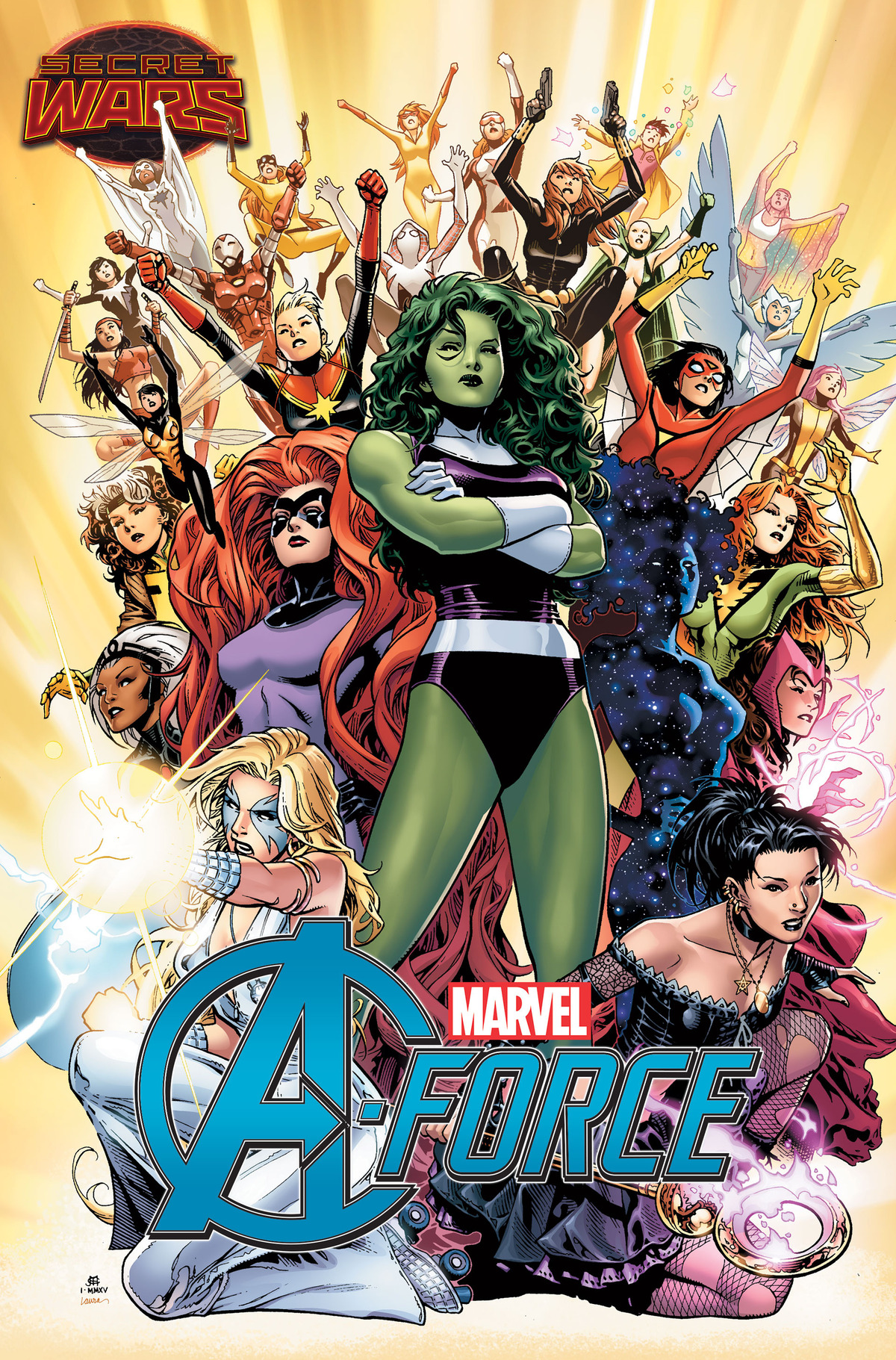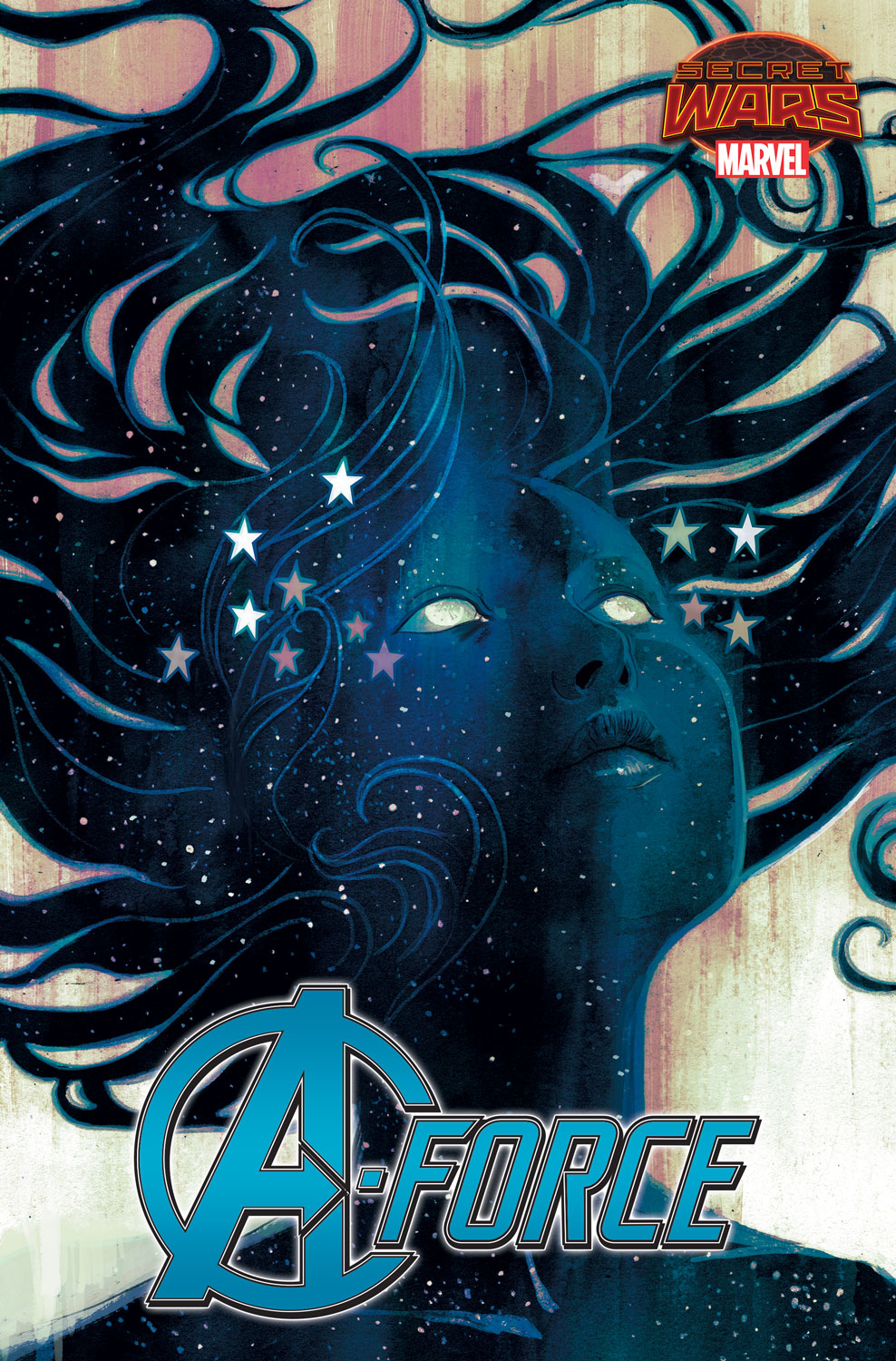
This summer, the Avengers will come to an end. No, not on the big screen, where they are due to make many more appearances in a host of sequels — but in the comics, where their union will be destroyed in the Secret Wars Marvel series. In their place, another kick-ass team will arise: the A-Force.
The new comic will bring together female characters from across the Marvel universe, from Dazzler to Medusa to She-Hulk. G. Willow Wilson (Ms. Marvel, X-Men) and Marguerite Bennett (Angela: Asgard’s Assassin) will pen the series with drawings by Jorge Molina (X-Men). In the wake of the Secret Wars destruction, readers will find the female heroes in Arcadia, a feminist utopia of sorts. When the peaceful home comes under attack from a familiar threat, the women will form the A-Force.
Marvel announced the new team as well as a new character today (the ladies will get a television introduction on The View Monday). The new hero, Singularity, is not a human but a cosmological event that has become self-aware (see concept art at the bottom of the post).
According to the writers, the announcement has been met with a great deal of fanfare on Twitter, a sign of progress for the comic book community. Even though Marvel has been methodically rolling out new female characters and promoting old ones over the past several years in an effort to reach out to its female fan base, the response to this progress hasn’t always been so positive: When Marvel announced that a woman would take up Thor’s hammer last summer, a loud minority objected to the decision on Twitter.
MORE: Marvel Comics Writers Explain Why They’re Making Thor a Woman
The comic book world is traditionally thought of as a male haven, but 47% of comic fans are female, according to Comics Beat. Fulfilling its stated mission to look like “the world outside your window,” Marvel has promoted the female Muslim hero Ms. Marvel, an all-female X-Men team and feminist pilot Captain Marvel (who will make her debut on the silver screen in 2017) in the last five years. The A-Force will be 15th female-led comic book series for the brand, and even the most traditional fans finally seem to be accepting that women can play leading roles in the comic book world too.
“I think an announcement like this is not as shocking as it would have been a couple of years ago,” says Wilson. “It used to be that a character like Ms. Marvel would have been the trifecta of death. It was a new character, a female character and a minority character headlining her own book. Traditionally, none of those things sell. But it did. And since that’s been overturned, everyone is excited to be on the cutting edge. Nobody wants to be left behind.”
In an industry where event books usually generate orders of around 100,000 copies, Marvel’s female-centric titles are exceeding expectations. Thor No. 1, the first comic featuring the female Thor, had over 200,000 orders, as does the upcoming Princess Leia of the Star Wars series, which will hit stands in March. Spider-Gwen No. 1—which takes place in an alternate universe where Peter Parker’s girlfriend Gwen Stacy is the one bitten by a radioactive spider—has over 250,000 orders. And the collected edition of Ms. Marvel Vol. 1, which G. Willow Wilson penned, was a New York Times bestseller.
The two A-Force authors attribute the recent spike in interest in female-led comics to social media. While readers have long asked for more representations of minorities and women in comic books, they haven’t followed through by purchasing those comics. But social media sites, forums for fan fiction and the ability to exchange tweets with comic book authors has created a groundswell of enthusiasm for female superheroes.
“Women have always read comics. It’s not that there are more women reading them now,” says Willow. “But I think that historically there have not been as many safe and welcoming spaces for women to talk about comics. And Tumblr and Twitter have provided that space where fans can connect with each other.”
The support for female comics has been bolstered by in-group events and conventions, like Comic-Con where women now make up almost half of the attendees. Other fans have pushed to make comics more accessible to young girls: The Valkyries, a group of women’s comics retailers, try to make comic book stores more welcoming to new readers who might be overwhelmed by the stacks of back issues and not know where to begin.
MORE: The Rise of Fangirls at Comic-Con
Marvel hopes the team concept in particular will help guide readers to other titles. “It is great to raise the profile of female characters who don’t have the same kind of cultural ubiquity that the male superheroes do,” says Bennett. “If we can create those kinds of icons that people can look up to and see themselves reflected in, we will have done some good.”
But despite increasing support and sales, comics that come from the female perspective are still a relatively new phenomenon. And while Bennet says she doesn’t pander to comic book audiences and “write for people who wouldn’t want to read my comic anyway,” she is aware of the responsibilities that come with carefully portraying female characters as empowered.
“You become aware of the toxic nonsense that you’ve internalized,” she said. “I have to keep in mind as I’m writing, I’m not just writing for this month or this year. People are ideally going to be reading these stories for decades to come, so I want to write to that future that I hope we will catch up with.”
To quote another Marvel character, with great power comes great responsibility. “Whenever you do something that is not typical, whether you like it or not, you are held to kind of a higher standard because there aren’t other things to compare it to,” adds Wilson. “So I think there’s this constant reflection about these stereotypes and your own personal experience. You have to be aware of how that might intrude into the story in a way that you’re not aware of or what parts you might want to highlight or address.”
What the two want to make is a set of heroes that young girls, older women and men can all aspire to be.
Read Next: Meet Captain Marvel: Fighter Pilot, Feminist and Marvel’s Big Gamble

More Must-Reads from TIME
- Why Trump’s Message Worked on Latino Men
- What Trump’s Win Could Mean for Housing
- The 100 Must-Read Books of 2024
- Sleep Doctors Share the 1 Tip That’s Changed Their Lives
- Column: Let’s Bring Back Romance
- What It’s Like to Have Long COVID As a Kid
- FX’s Say Nothing Is the Must-Watch Political Thriller of 2024
- Merle Bombardieri Is Helping People Make the Baby Decision
Write to Eliana Dockterman at eliana.dockterman@time.com